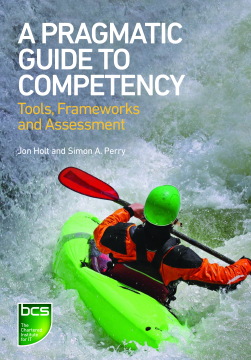
Additional Information
Book Details
Abstract
Competency is the ability of an individual to perform their working activities. Many organisations are able to demonstrate capability (ie that adequate processes are in place) but they do not have the appropriate competent staff to carry out these processes. This book takes a pragmatic approach to assessing competency against various frameworks. Essential reading for IT managers and directors, team leaders, consultants and managers in technical businesses.
Competency is the ability of an individual to perform their working activities. Many organisations are able to demonstrate capability (ie that adequate processes are in place) but struggle to demonstrate that they have the appropriate competent staff to carry out these processes. Therefore, there should be a strong link between capability and competence. Indeed, competency may be thought of as an enabler of capability. This book takes a pragmatic approach to assessing competency against various frameworks either individually or in a mix-and-match fashion and introduces one such assessment process, the Universal Competency Assessment Model (UCAM). Essential reading for IT managers and directors, team leaders, consultants and managers in technical businesses.
Jon Holt is the Global Head of Systems Engineering at Artisan and an award-winning author and public speaker, specialising in all aspects of systems, process and competency modelling. Simon Perry works on the application of systems modelling to process modelling, enterprise architectures, requirements engineering, capabilities and competencies.
Table of Contents
| Section Title | Page | Action | Price |
|---|---|---|---|
| Cover | Cover | ||
| Copyright | iv | ||
| A Pragmatic Guide to Competency | i | ||
| BCS the chartered institute for IT | ii | ||
| A Pragmatic Guide to Competency | iii | ||
| Contents | vii | ||
| List of figures and tables | ix | ||
| Authors | xiii | ||
| Acknowledgements | xiv | ||
| Preface | xvi | ||
| 1 Introduction | 1 | ||
| Competency assessment | 2 | ||
| People's perceptions of their own competence | 4 | ||
| Competence versus capability | 5 | ||
| Competency frameworks | 6 | ||
| Evolution of competence over time | 8 | ||
| Assessment versus audit | 8 | ||
| Scope of this book | 9 | ||
| Conclusions | 9 | ||
| References | 9 | ||
| 2 Competency frameworks | 11 | ||
| Introduction | 11 | ||
| The UKSPEC | 13 | ||
| The incose competencies framework | 15 | ||
| SFIA | 19 | ||
| The association of project management (APM) | 23 | ||
| The association of proposal management professionals | 27 | ||
| Choosing between frameworks | 30 | ||
| Conclusions | 35 | ||
| References | 35 | ||
| 3 Requirements for competency assessment | 37 | ||
| Introduction | 37 | ||
| Requirements for an assessment process | 37 | ||
| Introducing the universal competency assessment model (UCAM) | 39 | ||
| Self-assessment versus third-party assessment | 40 | ||
| Best practice | 41 | ||
| Bringing IT all together-the UCAM meta-model | 52 | ||
| Conclusions | 56 | ||
| References | 56 | ||
| 4 The universal competency assessment model (UCAM) processes | 57 | ||
| Introduction | 57 | ||
| The UCAM processes-an introduction | 58 | ||
| The framework definition process | 63 | ||
| The framework population process | 68 | ||
| The assessment set-up process | 76 | ||
| The assessment porocess | 82 | ||
| UCAM support processes | 91 | ||
| Using UCAM | 95 | ||
| Competency of assessors | 98 | ||
| Conclusions | 101 | ||
| References | 102 | ||
| 5 Case studies | 103 | ||
| Introduction | 103 | ||
| Case study 1 - generating a new framework | 103 | ||
| Case study 2 - executing the assessments | 121 | ||
| Case study 3 - educational framework | 134 | ||
| Conclusions | 145 | ||
| References | 145 | ||
| Appendices | 147 | ||
| Appendix A: A seven views summary of the UCAM processes | 149 | ||
| Introduction | 149 | ||
| Overview of the seven views approach | 149 | ||
| The seven views of UCAM | 152 | ||
| References | 163 | ||
| Appendix B: Summary of notation | 164 | ||
| Introduction | 164 | ||
| Class diagrams | 164 | ||
| Use case diagrams | 166 | ||
| Sequence diagrams | 168 | ||
| Activity diagrams | 169 | ||
| References | 170 | ||
| Index | 171 | ||
| Back Cover | 174 |
